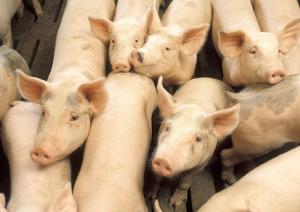The new vaccine helps fight a dangerous virus on pigs
Researchers at Kansas State University's Veterinary Medicine Department have completed a study showing that a new vaccine has been developed that is very effective against dangerous diseases caused by viruses that affect herds. pig in Kansas.
This is a complex form of circo virus infection in pigs - a virus that suppresses immunity or PCV2 first discovered in swine herds in Kansas in November 2005.
Clinical symptoms in pigs include immediate and severe weight loss, suppression of immunity, shortness of breath, jaundice and diarrhea. Some more serious cases can lead to symptoms of skin damage, nervous system decline, kidney failure and even death. People who raise pigs with infected pigs will have only 20 to 40% left, those from 10 weeks to 20 weeks old, causing great economic losses.
Researchers including Bob Rowland, Dick Hesse, Steve Dritz, Jerome Nietfeld and Kyle Horlen of the Ministry of Medicines and Pathology have begun testing a vaccine that can grow commercially in the summer of 2006. , directed by Professor Dritz and Horlen, tested on a family's pig farm in Northeast Kansas and promised positive results in January.

Clinical symptoms in pigs include immediate and severe weight loss, suppression of immunity, shortness of breath, jaundice and diarrhea.Some more serious cases can lead to symptoms of skin damage, nervous system decline, kidney failure and even death.People who raise pigs with infected pigs die only 20 to 40%, those from 10 weeks to 20 weeks old.(Photo: USDA Agricultural Research Service)
The study showed that the number of pigs that died in vaccinated pigs decreased by 50% compared to those not vaccinated. And the number of pigs that died in the vaccinated children was 7% while the non-vaccinated pigs were 17%.
The vaccinated animals also showed growth, they weighed an average of more than 20 pounds compared to the same uninfected child.
Rowland, a bacteriologist, a professor of diagnostic medicine and pathology, said the results showed that the vaccine was effective in controlling the virus caused by PCV2 in pigs.
The researchers also advised producers to suspect that their pigs showed signs of infection with PCV2 to contact their veterinarian to confirm the diagnosis and to request the vaccine to be available.
Professor Rowland said: "We want farmers to know that the vaccine is licensed by the US Department of Agriculture's Veterinary Biology Center."
The disease caused by PCV2 was first discovered in Canada a decade ago, then to Europe, and spread in most pig farming areas in the US, and it is reported that they are also traveling in many places. world.
Steve Henry, an Abilene pig veterinarian along with a Kansas assistant professor of medicine and pathology, is working closely with the research team to say how the virus spread remains The secret, and the outbreak can happen quickly, and despite the announcement in the biological security protocol, the pig business is still at the highest level.
Henry said it is necessary to create control strategies such as quarantine quarantine if the virus spreads to the border, and this is not a normal pandemic but in the first appearance it caused The spillover effect comes from just one translation point.
While the results from the research topic are significant, there are still many questions for Kansa state scientists about this emerging disease. And a special fund has been set up for studies devoted immediately to the dangerous circo virus on this pig.
Anh Phuong
- New HIV treatment vaccines successfully tested on people
- New hope in the fight against Ebola virus
- Prepare vaccine from gold
- Development of a vaccine to completely destroy SIV in monkeys
- Warning for more dangerous Ebola virus changes
- Detection of ebola virus in pigs
- Check out the most dangerous viruses on the planet
- Found a sample of hepatitis C vaccine
- Found a vaccine for HIV?
- Modified H5N1 virus can spread from pigs to humans
- The United States accelerates testing of Ebola vaccine in humans
- New discovery about the source of smallpox vaccine preparation
 'Barefoot engineer' invents a pipeless pump
'Barefoot engineer' invents a pipeless pump Process of handling dead pigs due to disease
Process of handling dead pigs due to disease Radiometer
Radiometer Warp Engine: Technology brings us closer to the speed of light
Warp Engine: Technology brings us closer to the speed of light